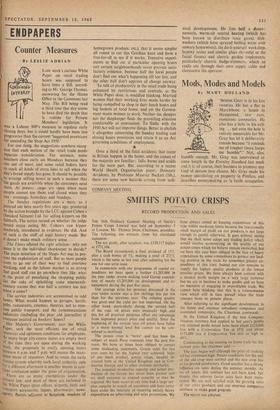ENDPAPERS
Counter Measures
By LESLIE ADRIAN
For one thing, the suggestions nowhere recog- nise that each section of the retail trade needs separate consideration. For instance, some butchers close early on Mondays because they run out of meat, and some retail bakers have to stock all kinds of extra lines to sell when the day's bread supply has gone. It should be possible to arrange selling hours in such a manner that the goods are available when the customers need them. At presew oops are open when most People cannot use them and closed when they can : evenings, Saturdays and Sundays.
The Sunday regulations are a mess, as I Pointed out here nearly five years ago, prompted by the action brought by the LCC against Cohen's (Smoked Salmon) Ltd. for selling kippers on the Sabbath. The action turned on whether the judge Would enjoy eating Mr. Cohen's raw kipper sandwich, introduced in evidence. He did. And of such is the stuff of legal history made. But It doesn't make much ordinary sense.
The Times offered the right solution : why not leave it to the individual shopkeeper to decide? The main intention of the Shops Act was to pre- vent the exploitation of staff. But as most people seem to go out of their way to find overtime Working, and as the labour market is so strong that good staff can go anywhere they like, what IS the point of penalising the shopping public for the sake of upholding some nineteenth- Century statute that was half a century too late When it carne?
The service industries are accustomed to odd hours. What would happen to garages, hotels. Pubs, restaurants, cinemas, theatres, not to men- tion public transport, and the communications industries (including the poor old journalist) if everyone insisted on bankers' hours?
Her Majesty's Government, says the White Paper, seek the most efficient use of retail resources and optimum conditions for employees. As many large city-centre stores are empty most of the time they are open during the working ,Week, the proposals to ossify opening hours between 6 a.m. and 7 p.m. will ensure the maxi- triltm waste of resources. And to retain the early Closing system whereby each local authority opts for a different afternoon is another means to con- tinue confusion under the guise of organisation.
There are so many exemptions under the Present law, and most of these are included in the White Paper (post offices, airports, fuels and transport accessories, liquor, pharmacies, news- agents, florists adjacent to hospitals, vendors of homegrown produce, etc.), that it seems simpler all round to cut this Gordian knot and have a free-for-all to see if it works. Tentative experi- ments to find out if particular opening hours suit certain neighbourhoods never provide satis- factory evidence, because half the local people don't find out what's happening till too late, and the other half don't approve of change anyway.
To talk of productivity in the retail trade being enhanced by restrictions and controls, as the White Paper does, is muddled thinking. Married women find their working lives made harder by being compelled to shop in their lunch hours and lug baskets of food home, and yet the Govern- ment wants women to work. Neither the shopper nor the shopkeeper finds the prevailing situation comfortable or convenient. To fiddle with the 1950 Act will not improve things. Better to abolish it altogether concerning the Sunday trading and closing hours provisions and retain it as an Act governing conditions of employment.
Over a third of the fatal accidents that occur in Britain happen in the home, and the causes of the majority are familiar : falls, burns and scalds for the most part. But, according to a recent World Health Organisation paper, Domestic Accidents, by Professor Maurice Sackett (10s.), there are some new hazards arising from tech- meal developments. He lists half a dozen: aerosols, warm-air central heating (which has been known to distribute toxic gases), dish- washers (which have sprayed boiling water over unwary housewives), the do-it-yoursell workshop, hypoxy resins and similar glues (h?rmful to the facial tissues) and electric garden implements, particularly electric hedge-trimmers, which so easily cut through their own supply cable and electrocdte the operator.


































 Previous page
Previous page